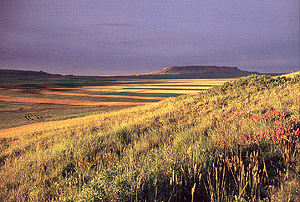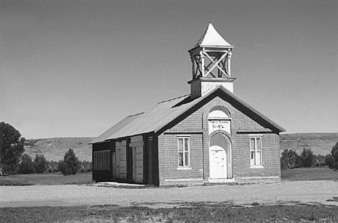
My name is June. I was the first of six daughters born to William (Bill) Leistiko and Ordell Hansen and was named after my father. Wouldn't you think a Montana wheat farmer would need lots of sons to help with the work? It was not to be. But I tried to help. I was always proud if Dad let me help with the work. It was such a grown-up thing to milk cows, hoe weeds in the garden, and work on the hay bailer with the men. I liked outside work better than housework.
Our son Brian would often ask, "Mom, tell me about the Pioneer days." Let me share some memories with you. I was a child born at the beginning of the depression era. Life for my parents was hard as they struggled to make enough money to survive and conquer continual wind, hail and not enough rain for the crops. I didn't know we were poor. Everyone had hand-me- down clothes and my Mom was an expert at making over old clothes in to new outfits for her girls. Mom would make "lumpy dick" when the cupboard was bare. She made us feel that the flour, grease and milk gravy was a special treat. You see, I had a loving family and was happy.
 |
We moved to the Geibel place, at the base of the famous Square Butte (shown in the famous painting Charles M. Russell and His Friends) near Sun River, Montana, when I was five years old. I have memories of deep snow and cold winter mornings huddling by the oil stove, monopoly games that kept us occupied in 40 below winters, 22 snake skins hanging on the fence one summer, grass hoppers devouring precious wheat crops, summer thunderstorms rolling across the hills. They included Saturday night baths in our oval, metal tub, kerosene lamps, a large black coal and wood burning stove in the kitchen, flat irons heated on the stove, the outhouse and cold winter walks.
I am glad I was raised at a time when we learned to work hard. My Dad taught us to do things right, never quit until you finished weeding the row, do what has to be done, and never complain. He had the most weed free fields in the area. These old fashioned work ethics kept me strong, independent and able to accomplish my goals later on in life
 |
My first school was in Sun River, Montana. It had two rooms for eight grades. If we made the honor roll, we would get the afternoon off to play on the day we received our report cards. (Of course, I got to roam the schoolyard and surrounding neighborhoods) The first day of school I couldn't read the "Boys" and "Girls" sign on the outhouses and was too shy to ask. I still remember my intense worry about which to use. In the winter, I had to stay with the bus driver's family when the roads were blocked with snow.
In the fourth grade we moved to the Hockersmith place (still near Square Butte). My Dad was a good farmer and was adding more acreage. The new house even had running water in the house and inside bathrooms. Harvests were the best time of year with many extra men to feed. Mom worked hard feeding everyone, plus baking all the bread, and tending the garden. Harvest time was often canning time, too and we girls washed many dishes for the harvest crew, plus all the bottles used for canning. But evenings were great and work was forgotten as we played Kick-the-Can in the cool, Montana twilight.
We went to Ft Shaw School from 4th to 7th grades. I had a teacher that wore the same suit the whole year. But I remember her best for teaching me to play the piano during the noon hour. What a great thrill for me. Our bunkhouse had an old piano and I had been trying to teach myself to play. This was the beginning of my lifetime love of music.
My parents were divorced in my 8th year of school. Mom and the six girls moved to the big city of Great Falls. One day after school, there was a wonderful surprise waiting for me. As I walked in the living room, I screamed with joy, when I saw a new piano with a big red ribbon hanging across it. Now I could start real piano lessons. Going to city schools was frightening but we did well. We never had a car and walked everywhere, no matter the wind, snow, or below freezing weather.
We were able to attend church for the first time since childhood and we loved learning about the Gospel. All six girls would walk to church every Sunday. I was privileged to teach a youth Primary class as a teen and that was when I first realized that I wanted to be a teacher.
I went to Great Falls High School during the war years. We planted a victory garden and adjusted to rationing. I earned money by babysitting at 25 cents an hour. I would get up at 6:00 and practice the piano. And my sisters accuse me of practicing when it was time for dishes, and that I never learned to cook. Oh, well. I was happy. Music, sports and reading became my passion. I loved having a big city Library. When I found an author I liked, I would read every book they wrote. I never missed any High School sports events, even when the temperature was below zero. After the games, my girl friends would often come to our home, where we would sing around the piano.
I moved to Anaconda, Montana in the fall of my senior year when my Mom married Norm Roragen and I graduated there in 1948. I then attended two years of college in Dillon, Montana with more music and sports, and finished a two-year teaching degree in Elementary Education.
I met my Prince Charming, Orra Lundgren, after he returned from World War II, when he started giving the Leistiko girls a ride home from church. I was only 16. He left home again to serve an LDS Mission to Hawaii among the Japanese people. After his mission he looked me up again, even though we had moved to Lewiston. And we were in love from that first weekend. We were married the next summer in July of 1950 in the Cardston, Alberta Temple.
We were blessed with four sons and one daughter. We also had a foster son who lived with us off and on for 16 years. Oh, yes. Sharon was #5, our one and only girl. She loved camping and nature as much as her brothers and almost always caught the biggest fish. Three sons were born in Montana and the last two kids were born in Arizona.
We spent our first year of marriage in Salt Lake City and then returned to our hometown of Great Falls. In December of 1955 we made a big move to Phoenix, Arizona where we bought and operated a pottery manufacturing business. We sold our pottery to Indian Curio shops. When Japan began copying Orra's original line of Kachina ware, we had to close our business, as we couldn't compete.
Then Orra returned to college and graduated with a teaching degree at the age of 39. (We had five kids when he finished) I taught piano lesson to help us get through school and he painted houses part time and Saturdays, a trade he learned from his Dad. We were able to accomplish this with no other financial help. I don't believe our kids realized they were poor either. We still believe we were able to accomplish this by living the law of tithing. We were blessed in so many ways. Work was always there when we needed it and there were no doctor bills. (No health insurance either)
Orra taught art and crafts at Scottsdale High School, starting at $4600 a year. For five summers the whole family went to the Boys Scout Camp Geronimo where Orra instructed at the Crafts Lodge and Archery range, June relaxed and the boys worked on merit badges and worked on Jr. Staff. The pay was not much but we had free food, a cabin to stay in and were in the mountains for the summer instead of the hot Valley sun. All four boys became Eagle Scouts.
In 1968 I graduated from ASU, twenty years after High School graduation. I taught school for 23 years in special education and music. We both received our Masters Degrees. (Orra in Art Education and June in Mental Retardation)
After retirement we served as missionaries in Nova Scotia and Prince Edward Island for 18 months. We loved the people and being able to serve them. We were sent to a community that had a nice chapel, with a piano and organ but nobody knew how to play. I was able to teach piano and my students are still progressing and playing for church services in the Maritimes. After we came home, we were called, as volunteers, to work with Arizona Food Banks and offer the use of our church welfare cannery in Mesa, to the community. We worked on many joint-canning projects with volunteers from local businesses to help the less fortunate in our state.
Orra has continued his art and does water color paintings. I am a charter member of the 130-voice Arizona Mormon Choir and we're in our 21st year. We give concerts for various community events and perform choral works with local symphonies. We still love to head for the mountains whenever we get the chance. But have come to love the Arizona desert as well.
Our family is close because we spent a lot of time together during the summers, enjoying camping and fishing. We enjoyed many vacations, traveling the 1200-mile trip north to visit our parents in our beloved Montana. We enjoy having our children live close by, giving us the opportunity to see our grandchildren and great grandchildren. We celebrated our 50th anniversary in July of 2000. Life has been good.
In the summer of 2001 we were thrilled to meet many of our Leistiko relatives. So many have helped to bring us together. It's exciting to see so many people interested in preserving the history of our family. Thanks to all who have contributed information and pictures.